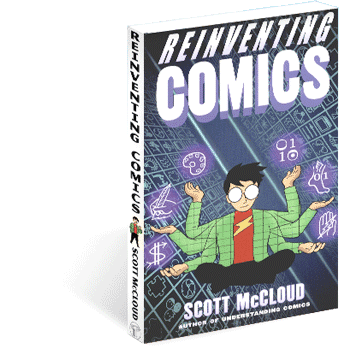2000
256 pages. Black and White.
The controversial 242-page follow-up to Understanding Comics advocates 12 different revolutions in the way comics are created, distributed and perceived with special emphasis on the potential of Online Comics.
Part One examines comics as an art form and as literature, creator's rights, the changing business of comics, public perception, and gender and ethnic diversity.
Part Two explores comics and new technology, including digital production, digital distribution, and the design challenges of comics in a digital environment.
"Anyone involved in interactive entertainment (games, web, etc.) should read this book. Scott McCloud has once again transcended the world of comics and tapped into much deeper issues of creativity, entertainment and economics. This time he's looking into the future rather than the past."
-- Will Wright, The Sims, Spore
"This is an exceptional book (in comic format) of ideas presented as a reader-friendly theoretical lecture -- and it may just be the blueprint for the very future of the comics industry. Strongly recommended for all public and academic libraries."
-- Library Journal
"Scott McCloud has got to be just about the smartest guy in comics. Once again, he's opened the floor to debate that will no doubt for on for years -- this time, with not just the definition of comics, but its very fate at stake."
-- Frank Miller, Sin City, 300, The Spirit
"Scott McCloud's Reinventing Comics is a manifesto, and an audacious one, irritating as the grain of sand which may one day produce a pearl. It will provoke a lot of arguments, it will make a lot of people think, and it may ultimately change the world a little -- which is, after all, what a manifesto is for."
-- Neil Gaiman, Coraline, The Graveyard Book
Author's note from 2002:
Understanding Comics had a long honeymoon, only drawing serious public critical scrutiny nearly 6 years after its 1993 publication. By 2000, however, I was ripe for a backlash. Many had been appalled by the clunky computer art in 1998's The New Adventures of Abraham Lincoln and my relentless advocacy of comics on the Web and disdain for traditional industry practices was beginning to wear thin in the struggling print market. As an optimist -- and an ethusiastic one at that -- I was closely linked to the gargantuan corporate media hype machine plastering ".com"s on every street corner throughout the 20th Century's last years; and when that bubble burst, it was assumed by many that it was time to burst my bubble as well.
In Comics Journal #232 and #234, a year after Reinventing Comics came out, legendary industry muckraker Gary Groth began a two-part demolition of the new book's Web predictions called "McCloud Cuckoo-Land" which gave voice to a lot of the bitterest complaints against the book and me (my response appeared in #235) and is likely the first in a continuing round of attacks from various quarters. In short, I expect it to be rough going in the comics market, at least through 2003.
I believe that Reinventing Comics has genuine flaws. The two halves don't always work well together, the storytelling is frequently stiffer and less convincing, and my enthusiastic advocacy of online comics is rarely tempered by some of the bleaker, more pessimistic scenarios offered by other writers in recent years. It was a harder book to write than Understanding Comics and, from all reports, a harder book to read. It's wordy, dogmatic and, in the DC Comics edition, even sports a disclaimer that explicitly disagrees with "many" of the book's conclusions.
Whatever the flaws of the book though, I still believe strongly in it's message. After 8 years of intense investigation, I remain convinced that the digital delivery of comics has the potential to revolutionize the industry, and that the aesthetic opportunities of digital comics are enormous. I don't know if Reinventing Comics is a good enough book to convince you of that, but I hope you'll give it a try.
--Scott (2002)
